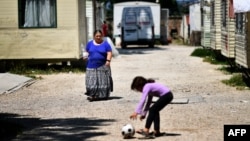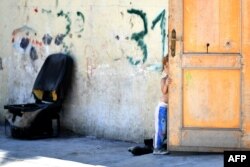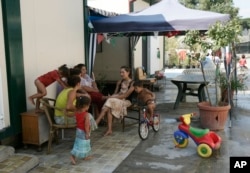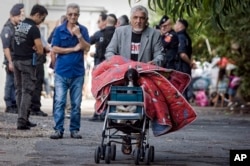They are accustomed to police raids in River Village, a litter-strewn, dusty camp of mobile homes just beyond Rome's ring-road and far from the foreign tourists and ancient sites of the Eternal City.
Last April, local police raided the camp, one of 148 government-recognized camps in Italy for Roma and Sinti people. They searched for stolen vehicles and checked residency papers.Ten people were arrested, 25 cars impounded and an illegal landfill of dangerous waste was sealed off.
The raid was taken as a signal by CasaPound, a neo-fascist grassroots group turned political party, to organize a demonstration a few days later to demand the camp's closure, which houses 400 people, half of them minors, saying it had become "a perfect example of abuse and illegality and degradation." That in turn in turn goaded gypsies and their supporters in anti-far-right groups to mount a counter-protest complaining of state abuse and the use of the "iron heel of fascism and Nazism."
There was no violence that day, only an exchange insults.
But a week after Italy's hardline interior secretary Matteo Salvini, the leader of the far-right Lega party, called for a head count of Roma people with a view to deporting those without papers, fears are growing that vigilante attacks on Roma camps, formal and informal, are only a matter of time.
"The politicians blow their whistles and the dogs come barking," says Giuseppe, a Roma.
Salvini has promised mass deportations of migrants in Italy illegally and has blocked the docking at Italian ports of NGO ships carrying mainly economic migrants from sub-Sahara Africa after they have been plucked from rickety dinghies in the Mediterranean.
"Irregular [undocumented] foreigners will be deported via agreements with other countries, but Italian Roma unfortunately you have to keep at home," Salvini told a north Italian broadcaster last week. His remarks prompted a chorus of outrage from critics as well as disapproval from leaders of the Lega's coalition partners, the Five Star Movement.
The Lega has already said it wants measures that would make it easier for authorities to remove Roma children from their families, if they are found not to be attending school.
Italy's Roma and Sinti population is estimated at between 130,000 to 170,000 with almost half believed to be Italian citizens. Most of the non-Italians, originate from the Balkans and Romania, but many are considered stateless, making it legally impossible to deport them anywhere. Deporting those with other EU nationalities would be difficult, breaching the bloc's rules of freedom of movement, although not entirely impossible on grounds of national security, say legal experts.
Salvini's proposal for a Roma registry would also appear to be still-born. In 2008, the government of Silvio Berlusconi proposed a Roma census to appease its Lega coalition partners, only for it to be deemed unconstitutional by the courts, notes Francesco Palermo, a leading human rights expert.
But he and others fear Salvini is playing with fire.
Many Italians have long resented and feared Roma people, associating them with crime. Polls suggest that two-thirds of Italians think all Roma and Sinti should be expelled. Berlusconi's embrace of a head-count fed anti-Roma hostility, prompting local police raids and creating the climate for a jump in vigilante attacks on camps of Roma and Sinti people and hate crimes towards them.
A Roma camp was burned to the ground in Naples by locals with the assistance of organized crime. The police stood by and watched.
The then leader of the Lega, Umberto Bossi, a minister in the Berlusconi government, declared, "The people do what the political class isn't able to do."
Then as now, the "Roma question" invoked chilling memories of the Mussolini era when foreign gypsies were expelled on grounds of public health and Italian-born ones were brutally treated in internment camps.
Now, Marcello Zuinisi, founder of the Associazione Nazione Rom, an organization lobbying for Roma people, has said he doesn't expect any government action to come from Salvini's pledge. "I don't think he is going to do anything.It's just talk," he told reporters. But some fear the talk itself can have unpredictable consequences.








